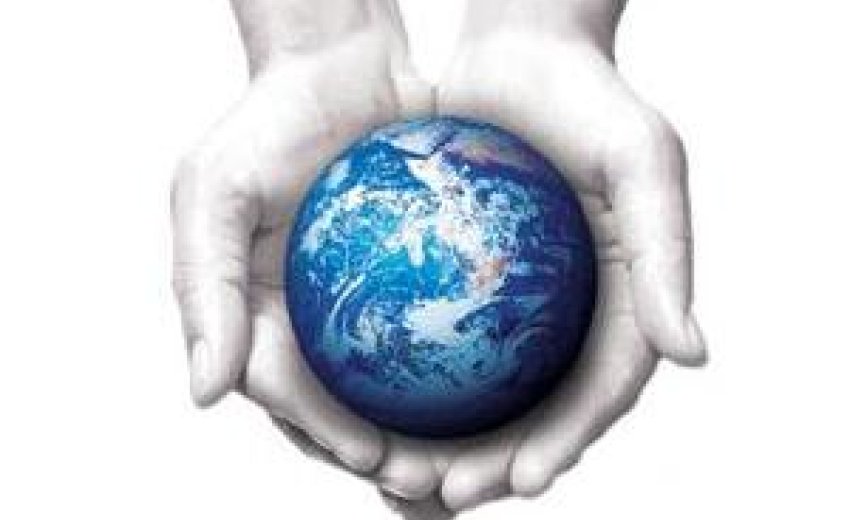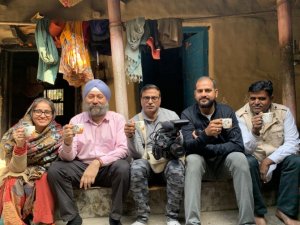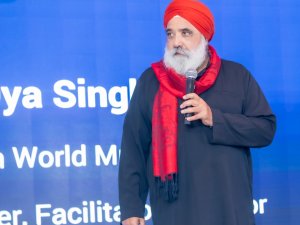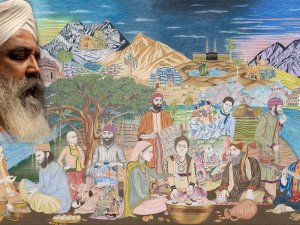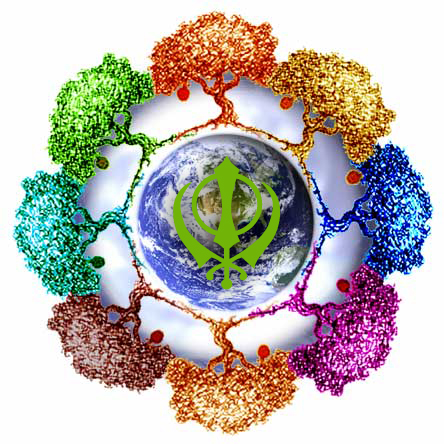 I witnessed something remarkable this Saturday evening (10 Mar.2012) in Melbourne, Australia, at the Whittlesea Council Assembly Hall. Politicians from our federal, state and local assemblies were present and some prominent Sikh luminaries, Sikh sangat and non-Sikhs got together to celebrate the Sikh New Year (14March). It was an initiative of this local council, under the auspices of one Harkieret Singh, ably supported by staff and councillors. I think even they did not know the anormity of the cause and initiative they were supporting. Even Sikhs present were more like guests rather than hosts. Celebrating Sikh New Year is something very new even to them! That enormity dawned upon me as I sat and listened and watched.
I witnessed something remarkable this Saturday evening (10 Mar.2012) in Melbourne, Australia, at the Whittlesea Council Assembly Hall. Politicians from our federal, state and local assemblies were present and some prominent Sikh luminaries, Sikh sangat and non-Sikhs got together to celebrate the Sikh New Year (14March). It was an initiative of this local council, under the auspices of one Harkieret Singh, ably supported by staff and councillors. I think even they did not know the anormity of the cause and initiative they were supporting. Even Sikhs present were more like guests rather than hosts. Celebrating Sikh New Year is something very new even to them! That enormity dawned upon me as I sat and listened and watched.
Firstly, let me remind all that 14 March is a triple whammy (forgive my Aussie slang) for us. It is not only the newly coined Sikh Environment Day but also the Sikh New Year Day and also the Gurpurab of our affectionately named 'Eco-Guru', Sri Guru Har Rai Ji. A day, which otherwise used to pass off as 'just another' Gurpurab but within a very short period - in fact, within this year, has suddenly become one of the most significant days in the international Sikh calender!
At the program, I asked for a show of hands as to how many 'Sikhs' knew that it was our New Year Day? A couple of hands went up! This, to the amusement of everyone else present! Majority of Sikhs think Vesakhi is the start of our new year!
Prominent members of our legislature including outgoing speaker of the Australian Federal Lower House, Mr. H. Jenkins, gave some insightful speeches about Sikhs in Australia. All had done their homewwork and were with us to celebrate.
Sikh luminary S. Gurbaksh Singh talked of the Nanakshahi calender. A personal message was read out from S. Purewal, the architect of the Nanakshahi calender. He lives in Canada.
As I sat there, the enormity and the significance of this day slowly dawned upon me. I had the opportunity of saying a few words too...
Even Sikhs, I do not think have actually fully woken up to this phenomenon of what 14 March is going to mean to us into the future.
This celebration is about:
1. Our International Identity as a community (quom). Dare I say 'nation' without borders?
2. Sikhs as an international, responsible community becoming super conscious of the environment and become eco-friendly collectively, as families and as individuals.
3. Sikhs playing an active responsible role in promoting multiculturalism which appears to be failing in some other countries.
4. Attaining a higher and more positive profile worldwide as a community which is hard-working, civic-minded and a credit to the nation in which they stay in - let it be USA, Canada, Australia, Malaysia even India and any other country. (For example, Sikhs are held in very high esteem in countries like UAE and even Iran and Afghanistan!)
Firstly, credit where credit is due. I believe the Washington Sikhs under the capable leadership of S. Rajwant Singh are to be credited for mooting this idea of International Sikh Environment Day and have rigorously promoted it. (If that is not true I am sure someone will correct me, for posterity.)
First, Sikhs have 'never' celebrated the Sikh New Year before! Some would celebrate the Gurpurab of Sri Guru Har Rai Ji. Now Sikh Environment Day is being promoted, but SIKHS HAVE NEVER CELEBRATED SIKH NEW YEAR DAY BEFORE! We celebrate Vesakhi. We celebrate even Divali, even though it has very little to do with us - some vague notion of Bandhi Shod Devas! We do the Holis, the Puranmashis, the Sangrandhs, the Gurpurabs, BUT NEVER SIKH NEW YEAR!
To me, this is a significant step in the progress of our efforts to establish our status as the Sikh 'quom' worldwide. Here we have a distinct identity, a worldwide presence, our own language, our own written script, a very colourful 544 year old history, including military history of tremendous valour especially alongside British forces worldwide over the last 200 odd years, and dare I say, a 'culture' which we call our own, but we still have growing pains from within and an identity crisis without.
Firstly we have the problem of 'ethnicity'. Are we an ethnic minority when it comes to minority monitoring by various governments worldwide? Though a British case called the Mandala case in the 1980's, established that 'Sikhs' should be considered an 'ethnic' minority for census purposes, we still have a problem with that internally. Rather than accepting that Sikhism is a complete 'way of life', we still like to separate 'religion' from 'culture' and once again we are lost in the quagmire of being 'Indians' or 'Punjabis' etc. for census purposes.
From within, there are 'Sikhs' who refuse to accept that we are not just a religious community but also an 'ethnic' community, based on a religion. For census purposes we are neither Indians, not even Punjabis but 'SIKHS'. As Indians we, being less than 2 percent of Indians, are lost amongst them. As Punjabis we are lost amongst Punjabi Hindus, Punjabi Muslims and Punjabi migrants from other Indian states. So, we shoot ourselves in the foot by putting ourselves down as Indians or Punjabis - even though others could well accept us as Sikhs!
As a collective body we can convince governments that we must be counted as Sikhs. We will probably get a better idea for example, as to how many Sikhs there are in Australia, UK, Canada, even in the world. At the moment because we ourselves do not hold ourselves out as Sikhs, the Sikh population worldwide cannot be stated with any semblence of accuracy. It ranges from 20million to over 30 million. At best a 30 percent error margin!
We now have a calender of our own and we now have a New Year Day celebration. Maybe we will find our international identity as Sikhs now?
Second, can Sikhs become eco-warriors? This stroke of genius of our new year day becoming Sikh Environment Day is a step n the right direction. Suddenly gurdwaras and smaller Sikh communities worldwide have become 'conscious' of environment issues, becoming eco-friendly, clean air campaigners, helping to clean up the environment, making efforts towards minimising the use of energy, growing more trees and most importantly, once a year, reviewing what we have already achieved in this direction. The Red Cross representative present at this celebration at Whittlesea paid a glowing tribute of how enthusiastic the Sikhs have been in donating blood - the best response from any ethnic community.
You only have to go to sites like sikhnet.com or sikhchic.com to see the impact we as an international community are making in environmental issues worldwide.
Third, multiculturalism. A number of countries namely UK, Belgium, Netherlands and France have either openly said so, or inferred, that Multiculturalism has failed. Analyses are being made as to why this has happened. My view is that these countries have actively, over the last 10 to 30 years helped and funded various ethnic minorities to feel more comfortable by funding them and joining them in celebrating their individual ethnicity - even giving concessions in helping these communities with unemployment payments and other social security handouts to encourage them to live their way of life sometimes leading to ghetto mentalities amongst some of these minorities.
In the Australian model in which we are all actively involved and wish to ensure that we succeed in, it was suggested that ethnic minorities, though encouraged to live their way of life should also be assisted to integrate into the mainstream 'Aussie' culture. It is often thought that the best of Aussie culture is footy, hamburghers, coca-cola and plenty of alcohol. In fact there are some wonderful Australian traits like - a sense of mateship, the concept of a 'fair-go' for everyone, a strong civic conscience, an attitude of 'she'll be right mate' which is close to our concept of 'Chardhi Kala' and finally, a certain disdain and sometimes aversion, towards authority - the larrakin in us. (To quote the founder of our Australian Democrat Party, Don Chip - 'to keep the bastards honest'!) I also strongly believe that all migrants into this country should be assisted to preserve their own language but they should also learn English. Sikhs must be proactive in ensuring that the concept of multiculturalism in their part of the world succeeds. That is part of the psyche of Sikh Environment Day too.
Lastly, Sikhs, a credit in the country they live in. We are truly a 'quom' without geographical boundaries. We are 'global' citizens in the true sense. Sikh Environment Day is the day when we can reflect on how we can raise our profile in the country we live in. For example. I have already mentioned Rajwant Singh and his Washington team which makes every effort to have audiences and programmes with their president, their Capitol Hill senators, their city mayors and so on promoting Vesakhi, or even Divali and multifaith gatherings in which they are prominent. In UK, we have Lord Indarjit Singh Ji, the Anglo-Sikh Trail Organisation and other Sikh 'mainstream' organisations. Bicky Singh and his team in Orange County, California; Nirinjan Singh and Kirtan Singh with high profile Sikh and interfaith projects in Los Angeles (southern California); mainstream celebrations of Vesakhi etc. and other high profile street processions, Nagar kirtans worldwide; KP Singh anchors some very high profile functions, mainly in the mainstream and especially in the interfaith arena in mid USA. Dr. Kapany and the Sikh Council hold Sikh exhibitions in galleries in the Bay area of San francisco. These are just the information that I get via emails. The same happens in Canada and now, even in New Zealand with federal MP, Kanwal Bakhshi at the helm. Recently, an international kabadi competition was held in cities in Iran hosted by the Sikh community there!!!
We are well poised, on some very courageous groundwork by some (I will name Khalsa Aid and United Sikhs here), to continue to raise our worldwide profile as a peace-loving and bridge-building community - and this is now part of the phenomenon of Sikh Environment Day cum Sikh New Year Day cum Gurpurab of eco-Guru, Sri Guru Har Rai Ji - today - 14 March.
It is quite amazing, that the one guru who perhaps does not get as much 'exposure' amongst Sikhs, has now stepped up and declared his relevance into the future when the environment has become the most important issue into the future. He is the gentle guru who advocated care for animals, care for the environment, encouraged the growing of trees, herbs and plants, herbal medicines for the sick (he is reputed to have cured the son of the Moghul emperor with his herbal medicines) and gentleness towards each other - dhan dhan Sri Guru Har Rai Ji.
For a modest start Khalsa Ji, may I request if all gurdwaras still dishing out paper napkins when degh is served and also still using paper plates for langgar - please do something about that. It is embarrassing to talk of the environment when we still have such wasteful exercises in our gurdwaras! Ladies, rest assured, the qhee from the degh is as good as any expensive moisturiser that you use for your hands! Do not use a tissue and wipe it away! Rub it into your hands!
Let us also take the modest step of also declaring Sikh Environment Day as the Sikh Open Day when we invite our non-Sikh friends to celebrate this wonderful day with us.
We are doing so at our Blackburn Gurdwara in Melbourne, Australia tonight when all nationalities have been invited and we have speakers from the Jewish. Christian and Muslem faiths to talk of efforts within their own communities concerning the environment.
We are also joining a group of our indigenous people to help them, with local tradesmen to clean up and give a facelift to their long neglected cemetary at a place called Cummeragunja - a project highly applauded by our state politicians.
A container is being organised by selfless sewadhars from Sikh and non-Sikh backgrounds in Melbourne to be sent to indigenous people on the islands of Mindanao, Phillipines because they have personally been in touch and are in dire need of basic necessities after devastating floods. Khalsa Aid and United Sikhs have been in the forefront of relief wk worldwide helping people in disaster regions.
Let us all celebrate Sikh Environment Day and become active eco-warriors and promoters of peace and harmony in the countries we live in. We are born leaders and also sewadhars in any country we call home. We now need to openly become 'sevak Sikh sebhai Kertara' - Sentinels of God.
Chardhi Kala ~ Dya Singh

